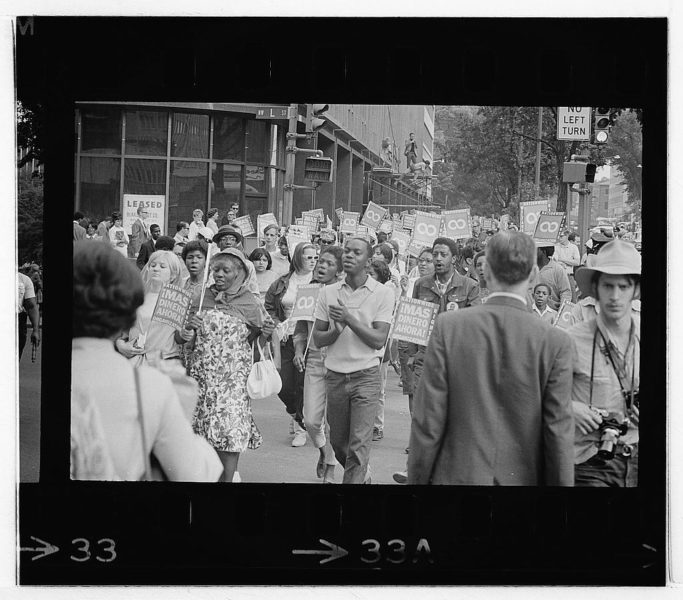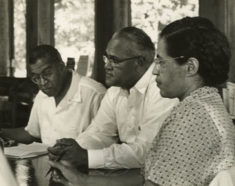About the project
A a group of poverty scholars and activists convened to mobilize a response to the 20th anniversary (in 2016) of the Personal Work and Opportunity Reconciliation Act and its devastating effects on poor communities. Seeking to dismantle narratives of welfare reform's success and to contextualize its origins and aftermath, one of the outcomes of their work is #WelfareReformSyllabus.
Ranging from the history of public assistance in the US to the racist and gendered backlash against welfare recipients to reflections on the current neoliberal state and the criminalization of the poor, the syllabus is intended to be accessed and shared widely as a tool for teaching and learning.
The syllabus is listed below, along with a downloadable annotated syllabus.
It can also be accessed via the Anna Julia Cooper Center website.
WELFARE REFORM SYLLABUS
Week 1. The History of Public Assistance in the U.S.
- Michael B. Katz, In the Shadow of the Poorhouse: A Social History of Welfare in America (Basic Books, 1996).
- Gwendolyn Mink, The Wages of Motherhood: Inequality in the Welfare State, 1917-1942 (Cornell University Press, 1996).
- Premilla Nadasen, Jennifer Mittelstadt, Marisa Chappell, Welfare in the United States: A History with Documents, 1935–1996 (Routledge, 2005).
- Annelise Orleck and Lisa Hazirjian eds. The War on Poverty, 1964-1980: A New Grassroots HIstory (University of Georgia Press, 2011).
- Karen M. Tani, States of Dependency: Welfare, Rights, and American Governance, 1935-1972 (Cambridge University Press, 2016).
Week 2. Federal Policy and the Racialized Ideology of Female Dependency
- Mimi Abramovitz, Regulating the Lives of Women: Social Welfare Policy From Colonial Times to the Present. (South End Press, 1996).
- Stephanie Coontz, The Way We Never Were: American Families and the Nostalgia Trap (Basic, 2016).
- Linda Gordon, Pitied but Not Entitled: Single Mothers and the History of Welfare, 1890-1935 (Harvard University Press, 1998).
- Nancy Fraser & Linda Gordon “Genealogy of dependency: Tracing a Key Word of the U.S. Welfare State,” Signs (Winter 1994): 309-335.
- Rickie Solinger, Beggars & Choosers How the Politics of Choice Shapes Adoption Abortion & Welfare in the United States (Hill & Wang, 2002).
Week 3. The Welfare Rights Movement and Social Activism of the 1960s and 1970s
- Rosie Bermudez, “Alicia Escalante, The Chicana Welfare Rights Organization, and the Chicano Movement,” in The Chicano Movement: Perspectives from the Twenty-First Century, Mario T. Garcia, eds. (Routledge, 2014);95-116.
- Felicia Kornbluh, The Battle for Welfare Rights: Politics and Poverty in Modern America (University of Pennsylvania Press, 2007).
- Lisa Levenstein, A Movement Without Marches; African American Women and the Politics of Poverty in Postwar Philadelphia (University of North Carolina Press, 2010).
- Gordon Mantler, Power to the Poor: Black-Brown Coalition and the Fight for Economic Justice, 1960-1974 (University of North Carolina Press, 2013).
- Premilla Nadasen, Welfare Warriors: The Welfare Rights Movement in the United States (Routledge, 2005).
- Annelise Orleck, Storming Caesars Palace: How Black Mothers Fought Their Own War on Poverty (Beacon Press, 2006).
- Crystal Sanders A Chance for Change: Head Start and Mississippi’s Black Freedom Struggle (University of North Carolina Press, 2016).
- Video: America’s War on Poverty (5-part series by Henry Hampton and Blackside)
- Guida West The National Welfare Rights Movement: The Social Protest of Poor Women (Praeger, 1981)
Week 4. Historicizing the Backlash Against Welfare
- Eva Bertam, The Workfare State: Public Assistance Politics from the New Deal to the New Democrats (University of Pennsylvania Press, 2015).
- Marisa Chappell, The War on Welfare: Family, Poverty, and Politics in Modern America (University of Pennsylvania Press, 2010).
- Daniel Geary, Beyond Civil Rights: The Moynihan Report and Its Legacy (University of Pennsylvania Press, 2015).
- Jennifer Mittelstadt, From Welfare to Workfare: The Unintended Consequences of Liberal Reform, 1945-1965. (University of North Carolina Press, 2006).
- Frances Fox Piven and Richard A. Cloward, The New Class War: Reagan’s Attack on the Welfare State and Its Consequences (Pantheon Books, 1985).
- Ellen Reese, Backlash Against Welfare Mothers: Past and Present (University of California Press, 2005).
Week 5. Framing the Lives of Welfare Recipients on the Eve of “Reform”
- Randy Albelda and Ann Withorn, eds. Lost Ground: Welfare Reform, Poverty and Beyond (South End Press, 2002).
- Lisa Dodson, Don’t Call Us Out of Name: The Untold Lives of Women and Girls in Poor America (Beacon Press, 1999).
- Kathryn Edin and Laura Lein, Making Ends Meet: How Single Mothers Survive Welfare and Low-Wage Work (Russell Sage Foundation, 1997).
- Gwendolyn Mink, Welfare’s End. (Cornell University Press, 1998).
- David Zucchino, Myth of the Welfare Queen (Scribner Publishers, 1997).
Week 6. Media Representation, Racial Politics and the Attack on Welfare
- Grace Chang, Disposable Domestics: Immigrant Women Workers in the Global Economy (South End Press, 2000).
- Martin Gilens, Why Americans Hate Welfare: Race, Media, and the Politics of Anti-Poverty Policy (University of Chicago Press, 1999).
- Ange-Marie Hancock, The Politics of Disgust: The Public Identity of the Welfare Queen (New York University Press, 2004).
- Melissa Harris-Perry, Sister Citizen: Shame, Stereotypes and Black Women in America (Yale University Press, 2011)
- Dorothy Roberts, Killing the Black Body: Race, Reproduction, and the Meaning of Liberty (Vintage, 1997).
- Bonnie Thornton Dill, Maxine Baca Zinn and Sandra Patton, “Race, Family Values and Welfare Reform” in A New Introduction to Poverty: The Role of Race, Power, and Politics, edited by L. Kushnick and J. Jennings (NYU Press, 1999): 263-286.
Week 7. The Politics and Paradigms of Welfare Research
- Karen Christopher, “Welfare as we [don’t] know It: A review and feminist critique of welfare reform research.” Feminist Economics 10: 2 (2004): 142-171.
- Joel F. Handler and Yeheskel Hasenfeld, Blame Welfare, Ignore Poverty and Inequality. (Cambridge University Press, 2006).
- Alice O’Connor Poverty Knowledge: Social Science, Social Policy, and the Poor in Twentieth-Century U.S. History (Princeton University Press, 2001).
- Sanford Schram, Words of Welfare: The Poverty of Social Science and the Social Science of Poverty (University of Minnesota, 1995).
Week 8. The Experiences of Welfare Recipients Post-1996
- Mimi Abramovitz, Under Attack, Fighting Back : Women and Welfare in the United States (Monthly Review Press, 2000).
- Katherine Boo 2001. “After welfare.” The New Yorker, April 9, 93-107.
- Michael Fix, ed. Immigrants and Welfare: The Impact of Welfare Reform on America’s Newcomers (Russell Sage Foundation, 2009).
- Luisa Deprez and Mary Gatta, eds.“Beyond the Numbers: How the Lived Experiences of Women Challenges the ‘Success’ of Welfare Reform” Journal of Sociology and Social Welfare. September 2008.
- Sharon Hays, Flat Broke with Children: Women in the Age of Welfare Reform (Oxford University Press, 2003)
- Zaid Jilani “The Tragic End of the Woman Bill Clinton Exploited as Poster Child for Ending Welfare” Alternet (May 15, 2015)
- Laura Lein and Deanna T. Schexnayder; with Karen Manges Douglas and Daniel G. Schroeder, Life After Welfare: Reform and the Persistence of Poverty (University of Texas Press, 2007).
Week 9. Work and Welfare in the Neoliberal Era
- Jane Collins and Victoria Mayer, Both Hands Tied: Welfare Reform and the Race to the Bottom in the Low-Wage Labor Market (University of Chicago Press, 2010).
- Alejandra Marchevsky and Jeanne Theoharis, Not Working: Latina Immigrants, Low-Wage Jobs, and the Failure of Welfare Reform (NYU Press, 2006).
- Sandra Morgen, Joan Acker, and Jill Weigt, Stretched Thin: Poor Families, Work, and Welfare Reform (Cornell University Press, 2010).
- Jamie Peck, Workfare States (Guilford Press, 2001).
- Loic Wacquant, “Crafting the Neoliberal State: Workfare, Prisonfare, and Social Insecurity” Sociological Forum, Vol. 25, No. 2, June 2010.
Week 10. Welfare Reform and Education
- Vivyan Adair, “Poverty and the (Broken) Promise of Higher Education.” Harvard Educational Review: July 2001, Vol. 71, No. 2, pp. 217-240.
- Amanda Freeman “Single moms and welfare woes: A higher-education dilemma” The Atlantic (August 16, 2015).
- Peggy Kahn, Luisa S. Deprez, Sandra S. Butler and Valerie Polakow, Shut Out : Low Income Mothers and Higher Education in Post-Welfare America. (State University of New York Press, 2004).
- A. Jones-DeWeever,“When the spirit blooms: Acquiring higher education in the context of welfare reform. Journal of Women, Politics & Policy, 27(3-4) 2008: 113-133.
- Lorna Rivera Laboring to Learn: Women’s Literacy & Poverty in Post-Welfare Era (University of Illinois Press, 2008).
- Carla Shedd Unequal City: Race School and Perceptions of Injustice (Russell Sage, 2015).
Week 11. Food Insecurity, Housing, and Federal Policy
- Matthew Desmond, “Forced Out: For Many Poor Americans, Eviction Never Ends” The New Yorker (February 8 & 15, 2016).
- Roberta Feldman and Susan Stall, The Dignity of Resistance: Women Residents’ Activism in Chicago Public Housing (Cambridge University Press, 2004).
- Susan Levine, School Lunch Politics: The Surprising History of America’s Favorite Welfare Program (Princeton University Press, 2010).
- Caitlin Rathe, “The Right’s Food Stamp Embarassment: A history lesson for the haters” Salon (September 1, 2014)
- Loretta Schwartz-Nobel, Growing Up Empty: How Federal Policies are Starving America’s Children (Harper Perennial, 2003).
- Rhonda Y. Williams, The Politics of Public Housing; Black Women’s Struggles against Urban Inequality (Oxford University Press, 2005).
- Rhonda Y. Williams, “ ‘Something’s wrong down here’: Low-Income Black Women and Urban Struggles for Democracy”,” African American Urban History Since World War II, eds. Kenneth L. Kusmer and Joe W. Trotter (University of Chicago Press, 2009).
Week 12. The Criminalization of Poor People
- Jeanne Flavin, Our Bodies, Our Crimes: The Policing of Women’s Reproduction in America (New York University Press, 2008).
- Kaaryn Gustafson, Cheating Welfare: Public Assistance and the Criminalization of Poverty (New York University Press, 2011).
- Elizabeth Hinton, From the War on Poverty to the War on Crime: The Making of Mass Incarceration in America (Harvard University Press, 2016).
- Julilly Kohler-Hausmann, “Guns and Butter: The Welfare State, the Carceral State, and the Politics of Exclusion in the Postwar United States,” Journal of American History 102, no. 1 (2015), 87-99
- National Law Center on Homelessness & Poverty et al., Criminalization of Homelessness in the United States of America: A Report to the U.N. Committee Against Torture (2014).
- Frances Fox Piven and Richard A. Cloward Regulating the Poor: The Functions of Public Welfare (Pantheon, Revised Edition 1993).
- Joe Soss, Richard C. Fording and Sanford F. Schram, Disciplining the Poor: Neoliberal Paternalism and the Persistent Power of Race (Chicago: University of Chicago Press, 2011).
Week 13. Family Life and Gendered Care Work
- Randy Albelda “Time Binds: US anti-poverty policies, poverty and single mother’s wellbeing” Feminist Economics (2011).
- Eileen Boris and Jennifer Klein, Caring for America: Home Health Workers in the Shadow of the Welfare State (Oxford University Press, 2012).
- Lisa Dodson & Wendy Luttrell, “Families Facing Untenable Choices,” Contexts, Vol. 10, No. 1,Winter 2011: 38-42.
- Madonna Harrington Meyer, Care Work: Gender Labor and the Welfare State (Routledge, 2000).
- Evelyn Nakano Glenn, Forced to Care: Coercion and Caregiving in America (Harvard University Press, 2010).
- Dorothy Roberts, Shattered Bonds: The Color of Child Welfare (Basic Books, 2002).
Week 14. Twenty Years After Welfare Reform
- Mimi Abramovitz “The Largely Untold Story of Welfare Reform and the Human Services” . Social Work 2 (2005):175-186.
- Haksoon Ahn, “Economic well-being of low-income single-mother families following welfare reform in the USA.” International Journal of Social Welfare (2015) Vol. 24.: 14-26.
- Stan L. Bowie and Donna M. Dopwell, “Metastressors as Barriers to Self-Sufficiency Among TANF-Reliant African American and Latina Women.” Journal of Women and Social Work: 2013, Vol. 28, No. 2, pp. 177-193.
- Peter Edelman “The War on the Poor” The American Prospect (December 21, 2015).
- Kathryn Edin and H. Luke Schaefer $2 a Day: Living on Almost Nothing in America (Houghton Mifflin, 2015).
- Annie Lowery “It’s Time For Welfare Reform Again” New York Magazine
- Alejandra Marchevsky and Jeanne Theoharis “Why It Matters that Hillary Championed Welfare Reform,” The Nation (March 1, 2016).
Week 15. New Movements Rising
- Willie Baptist and Jan Rehmann, Pedagogy of the Poor: Building the Movement to End Poverty (Teachers College Press, 2013).
- The Reverend Dr. William Barber and Jonathan Wilson Hartgrove The Third Reconstruction: Moral Mondays, Fusion Politics and the Rise of a New Justice Movement (Beacon Press, 2016).
- The Poverty Initiative, A New and Unsettling Force: Re-Igniting Rev. Dr. Martin Luther King Jr.’s Poor People’s Campaign, (The Poverty Initiative at Union Theological Seminary, 2009).
- William Baptist, Mary Bricker-Jenkins and Monica Dillon, “Taking the Struggle on the Road: The New Freedom Bus—Freedom from Unemployment, Hunger and Homelessness,” Journal of Progressive Human Services 10:2 (1999): 7-29.
- Kathleen Coll, Remaking Citizenship: Latina Immigrants and New American Politics (Stanford University Press, 2010).
- Ellen Reese. “They Say Cutback, We Say Fightback!” Contemporary Welfare Rights Activism in an Era of Retrenchment. (Russell Sage, 2011).
- Rose Ernst, The Price of Progressive Politics: The Welfare Rights Movement in an Era of Colorblind Racism (New York University Press, 2010.
- Video:Living Broke in Boom Times, Skylight Pictures, 2009.
MEDIA:
- Interactive Website: Your State on Welfare
- Podcasts: Poverty in America: The Struggle to Get Ahead
- Infographic: Thirty Years of Poverty
- Video: Welfare and the Politics of Poverty New York Times (May 3, 2015).
CONTRIBUTORS:
- Mimi Abramovitz, Bertha Capen Reynolds Professor of Social Policy at the Silberman School of Social Work, Hunter College, City University of New York and the CUNY Graduate Center.
- Randy Albelda, Professor of Economics, Senior Research Fellow at the Center for Social Policy, University of Massachusetts Boston
- Eileen Boris, Hull Professor of Feminist Studies, Professor of History, Black Studies, and Global Studies, University of California, Santa Barbara
- Dominick Braswell, Brooklyn College of CUNY, Research Assistant
- Mary Bricker-Jenkins, Professor Emerita, Temple University
- Marisa Chappell, Associate Professor of History, Oregon State University
- Luisa S. Deprez, Professor Emerita of Sociology, University of Southern Maine
- Lisa Dodson, Senior Scientist at the Institute for Child, Youth and Family Policy (ICYFP), Brandeis University
- Amanda Freeman, Visiting Assistant Professor, Central Connecticut State University
- Mary Gatta, Associate Professor of Sociology, Stella and Charles Guttman Community College, CUNY
- Linda Gordon, University Professor of the Humanities and Florence Kelley Professor History, New York University
- Ange-Marie Hancock, Associate Professor of Political Science and Gender Studies, University of Southern California, Dornsife
- Melissa Harris-Perry, Presidential Endowed Chair in Politics and International Affairs, Wake Forest University, Executive Director of the Pro Humanitate Institute and founding director of the Anna Julia Cooper Center on Gender, Race, and Politics in the South
- Alice Kessler Harris, R. Gordon Hoxie Professor of History, Emerita, Columbia University
- Lisa Levenstein, Associate Professor of History, University of North Carolina, Greensboro
- Wendy Luttrell, Professor of Urban Education and Sociology, Graduate Center, City University of New York
- Alejandra Marchevsky Professor of Liberal Studies and Women’s, Gender, and Sexuality Studies, Cal State, L.A.
- Gabriel Matthews, Program Associate and co-Chair of the Diversity and Inclusion Committee, Roosevelt Institute
- Jennifer Mittelstadt, Professor of History, Rutgers University
- Tom Mould, Professor of Anthropology and Folklore, Elon University
- Premilla Nadasen, Associate Professor of History, Barnard College
- Annelise Orleck, Professor of History, Women’s and Gender Studies and Jewish Studies at Dartmouth College
- Frances Piven, Distinguished Professor, Sociology and Political Science, Graduate Center, CUNY
- Bill Quigley, Human Rights Lawyer and Law Professor, Loyola University New Orleans
- Lorna Rivera, Associate Professor of Women’s and Gender Studies and Associate Director of the Gaston Institute for Latino Public Policy, University of Massachusetts, Boston
- Sanford Schram, Professor of Political Science, Hunter College, CUNY and Faculty Associate at the Roosevelt House Public Policy Institute
- Carla Shedd, Assistant Professor of Sociology and African American Studies, Columbia University
- Jeanne Theoharis, Distinguished Professor of Political Science, Brooklyn College of CUNY
- Liz Theoharis, Co-Director of the Kairos Center, Founder and Coordinator of the Poverty Initiative at Union Theological Seminary
- Yesenia Treviño, Cal State L.A., Research Assistant
- Traci West, Professor of Ethics and African American Studies at Drew University Theological School
- Rhonda Y. Williams, Founder and Director, Social Justice Institute and Professor of History, Founder and Director of the Postdoctoral Fellowship in African American Studies, Case Western Reserve University
This initiative was supported by the Narrating Change, Changing Narratives research group of the Seminar for Public Engagement and Collaborative Research.



